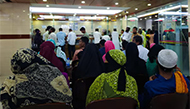Yet Israeli settlements here on the West Bank mar the elections, and the future of the country itself. The 350,000 Israeli settlers in the West Bank . not even counting those in Arab East Jerusalem . impede any Middle East peace and stain Israel’s image.
But let’s be clear: The reason to oppose settlements is not just that they are bad for Israel and America, but also that this nibbling of Arab land is just plain wrong. It’s a land grab. The result is a “brutal occupation force,” in the words of the late Avraham Shalom, a former chief of the Israeli internal security force, Shin Bet.
Most Israeli settlers are not violent. But plenty are . even stoning American consular officials early this year . and they mostly get away with it because settlements are an arm of an expansive Israeli policy. The larger problem is not violent settlers, but the occupation.
“We planted 5,000 trees last year,” Mahmood Ahmed, a Palestinian farmer near Sinjil told me. “Settlers cut them all down with shears or uprooted them.”
Israel has enormous security challenges, but it’s hard to see the threat posed by 69-year-old Abed al-Majeed, who has sent all 12 of his children to university. He told me he used to have 300 sheep grazing on family land in Qusra but that nearby settlers often attack him when he is on his own land; he rolled up his pant leg to show a scar where he said a settler shot him in 2013. Now he is down to 100 sheep.
“I can’t graze my sheep on my own land,” he said. “If I go there, settlers will beat me.”
Sarit Michaeli of B’Tselem, an Israeli human rights group, accompanied me here and said that the allegations are fully credible. Sometimes Palestinians exaggerate numbers, she said, but the larger pattern is undeniable: “the expulsion of Palestinians from wide areas of their agricultural land in the West Bank.”
Elsewhere, I saw graffiti that said “Death to Arabs” in Hebrew, heard Palestinians say that their olive trees had been poisoned or their tires slashed, and talked to an Arab family whose house was firebombed in the middle of the night, leaving the children traumatized.
The violence, of course, cuts both ways, and some Israeli settlers have been murdered by Palestinians. I just as easily could have talked to settler children traumatized by Palestinian violence. But that’s the point: As long as Israel maintains these settlements, illegal in the eyes of most of the world, both sides will suffer.
To its credit, Israel sometimes lets democratic institutions work for Palestinians. In the southern West Bank, I met farmers who, with the help of a watchdog group, Rabbis for Human Rights, used Israeli courts to regain some land after being blocked by settlers. But they pointed wistfully at an olive grove that they are not allowed to enter because it is next to an outpost of a Jewish settlement.
They haven’t been able to set foot in the orchard for years, but I, as an outsider, was able to walk right into it. A settler confronted me, declined to be interviewed, and disappeared again . but the Palestinians who planted the trees cannot harvest their own olives.
A unit of Israeli soldiers soon showed up to make sure that there was no trouble. They were respectful, but, if they were really there to administer the law, they would dismantle the settlement outpost, which is illegal under Israeli as well as international law.
Kerem Navot, an Israeli civil society organization, has documented “the wholesale takeover of agricultural lands” by Israeli settlers. It notes that this takeover is backed by the Israeli government “despite the blatant illegality of much of the activity, even in terms of Israeli law.”
There are, of course, far worse human rights abuses in the Middle East; indeed, Israeli journalists, lawyers, historians and aid groups are often exquisitely fair to Palestinians. Yet the occupation is particularly offensive to me because it is conducted by the United States’ ally, underwritten with our tax dollars, supported by tax-deductible contributions to settlement groups, and carried out by American bulldozers and weaponry, and presided over by a prime minister who is scheduled to speak to Congress next week.
At a time when Saudi Arabia is flogging dissidents, Egypt is sentencing them to death, and Syria is bombing them, Israel should stand as a model. Unfortunately, it squanders political capital and antagonizes even its friends with its naked land grab in the West Bank. That’s something that Prime Minister Benjamin Netanyahu might discuss in his address to Congress.
스마터리빙
more [ 건강]
[ 건강]이제 혈관 건강도 챙기자!
[현대해운]우리 눈에 보이지 않기 때문에 혈관 건강을 챙기는 것은 결코 쉽지 않은데요. 여러분은 혈관 건강을 유지하기 위해 어떤 노력을 하시나요?
 [ 건강]
[ 건강]내 몸이 건강해지는 과일궁합
 [ 라이프]
[ 라이프]벌레야 물럿거라! 천연 해충제 만들기
 [ 건강]
[ 건강]혈압 낮추는데 좋은 식품
[현대해운]혈관 건강은 주로 노화가 진행되면서 지켜야 할 문제라고 인식되어 왔습니다. 최근 생활 패턴과 식생활의 변화로 혈관의 노화 진행이 빨라지고
사람·사람들
more많이 본 기사
- 남궁옥분 “故 송도순, 열흘 전부터 혼수상태..큰 별 졌다”
- 베네수엘라, 美압박에 맞서 미국인 구금…최소 5명 체포
- [미주 한국일보 2026년 연중 기획 사업] 매년 풍성하고 유익한 행사… 올해도 한인사회와 함께
- 진태현♥박시은, 임신 시도 중단.. “2세 계획, 가슴 무너지지만 멈춰야”
- 새로운 여명… 이제 다시 희망이다
- 이혜훈 ‘보좌진 갑질’ 녹취 폭로…국힘 “청문회 통과 어려울 것”
- [새해 정치 풍향계… 2026 중간선거 전망] 트럼프 2기 중간평가의 시간… 민심은 어디로
- 첫 무슬림 뉴욕시장 맘다니 취임…쿠란 위에 손 얹고 선서
- 16개 경기장 면면은… LA 소파이 스테디엄에 ‘뜨거운 함성’ 몰려온다
- [2026 북중미 월드컵 상금은] 6억5천만달러 ‘돈 잔치’… 우승하면 5천만달러
- 2026 북중미 월드컵에서 사용될 공인구는 ‘트리온다’
- 60년만에 은퇴하는 ‘오마하의 현인’ 버핏…누적 수익률은 610만%
- [한국 대표팀 북중미 월드컵 로드맵은] ‘역대급 조편성’ 홍명보호, 32강 넘어 16강 갈까
- [새해 암호화폐 시장은 어디로- 현황과 전망] “낙폭 뒤의 기회” vs.“불확실성 당분간 지속될 것”
- [유통되는 암호화폐 종류는] 비트코인·이더리움 잘 알려졌지만 수만개 존재
- [미리 보는 2028년 LA 하계올림픽] 역대 최대 규모… LA, 전 세계 스포츠 ‘메카’로
- 유승민, ‘李정부 총리 제의설’ 확인… “생각 다른 사람과 일못해”
- 미국·캐나다·멕시코, 2026 북중미 월드컵의 모든 것… ‘축구 대제전’ 전 세계 이목 미국으로
- LA 올림픽, 도시 전체가 경기장… 한인타운 인근서도 경기
- “AI·소비가 경제 ‘버팀목’… 금리인하로 주택시장 반등”
- [2026 중간선거 - 뛰는 한인 정치인들] 한인 정치력 신장… 캘리포니아서 도약 이끈다
- [말띠 독자들의 새해 소망·다짐] ‘붉은 말’처럼 역동적으로… 힘찬 도약과 성취를
- 재외동포, 2년 새 7만5천명 줄었다…181개국에 700만 명 거주
- 韓 사상 첫 7천억달러 수출…반도체 수출 ‘역대 최대’로 견인
- ‘함께 가는 저녁길’· ‘톰과제리’ 성우 송도순 별세
- 낸시랭, 사채 빚 15억 떠안았다..오열 고백 “좀비떼처럼 뜯어 먹어”
- 미국 정부, TSMC에도 美반도체장비 中공장 반입 허가
- 中왕이 “日일부세력, 역사 후퇴 시도…韓, 올바른 입장 취해야”
- 오픈AI 직원, 올해 평균 150만 달러치 주식 받아…역대 빅테크 최고
- 새해엔 평화 찾아올까…지구촌 희망 찬 신년 맞이
- ‘억’ 소리 나는 ‘개념 부부’..신민아♥김우빈·손예진♥현빈
- 권혁인 목사 /UMC 한인총회장 /산타클라라 연합감리교회
- 뉴욕증시 주요지수 3년 연속 상승…S&P500 연간 16%↑
- “트럼프 리조트의 마사지사들, 엡스타인에 방문 서비스 제공”
- SF 상공회의소 차기회장에 그린장 SF한인회 부회장
- ‘붉은 말의 해’ 열리다
- ‘상간녀 의혹’ 숙행, 리액션만 간신히 건졌다..무대는 통편집
- 조세호 ‘조폭 연루설’ 털고 빠른 복귀 수순.. ‘도라이버’ 시즌4 합류
- 새크라멘토 CBMC 송년모임 열어
- “추신수는 지울 수 없는 발자취 남겼다” 美 야구기자, 명예의 전당 투표서 ‘CHOO 선택’ 이유 밝혔다
- “학생 백신 접종률 급감”
- 말리·부르키나파소 “미국인 오지마”…美입국 금지에 맞불
- 성희준의 베이지역 풋볼 (2025시즌 제 17주)
- ‘붉은 말의 해’ 동해안 해맞이객 북적… “건강·평안” 소망 기원
- 트럼프, 집권2기 첫 법안 거부권… ‘보복성’ 권한 행사 논란
- 조계종 총무원장 신년 메시지
- 김신호씨, KARL 신임 회장 취임
- [새해 달라지는 교통법규] 과속·음주운전 처벌 가주서 대폭 강화
- “메타, 사기광고 규제 피하려 검색결과 조작…대응지침도 마련”
- 지방세 공제한도 1만→4만달러로 상향 1
1/5지식톡

-
 미 육군 사관학교 West Poin…
0
미 육군 사관학교 West Poin…
0https://youtu.be/SxD8cEhNV6Q연락처:wpkapca@gmail.comJohn Choi: 714-716-6414West Point 합격증을 받으셨나요?미 육군사관학교 West Point 학부모 모…
-
 ☝️해외에서도 가능한 한국어 선생님…
0
☝️해외에서도 가능한 한국어 선생님…
0이 영상 하나면 충분합니다!♥️상담신청문의♥️☝️ 문의 폭주로 '선착순 상담'만 진행합니다.☎️ : 02-6213-9094✨카카오톡ID : @GOODEDU77 (@골뱅이 꼭 붙여주셔야합니다…
-
 테슬라 자동차 시트커버 장착
0
테슬라 자동차 시트커버 장착
0테슬라 시트커버, 사놓고 아직 못 씌우셨죠?장착이 생각보다 쉽지 않습니다.20년 경력 전문가에게 맡기세요 — 깔끔하고 딱 맞게 장착해드립니다!장착비용:앞좌석: $40뒷좌석: $60앞·뒷좌석 …
-
 식당용 부탄가스
0
식당용 부탄가스
0식당용 부탄가스 홀세일 합니다 로스앤젤레스 다운타운 픽업 가능 안녕 하세요?강아지 & 고양이 모든 애완동물 / 반려동물 식품 & 모든 애완동물/반려동물 관련 제품들 전문적으로 홀세일/취급하는 회사 입니다 100% …
-
 ACSL 국제 컴퓨터 과학 대회, …
0
ACSL 국제 컴퓨터 과학 대회, …
0웹사이트 : www.eduspot.co.kr 카카오톡 상담하기 : https://pf.kakao.com/_BEQWxb블로그 : https://blog.naver.com/eduspotmain안녕하세요, 에듀스팟입니다…
케이타운 1번가
오피니언
 정숙희 논설위원
정숙희 논설위원샴페인, 마지막 날과 첫날을 위하여
 조지 F·윌 워싱턴포스트 칼럼니스트
조지 F·윌 워싱턴포스트 칼럼니스트 [조지 F. 윌 칼럼] 저무는 2025년에 안도의 한숨
 김동찬 시민참여센터 대표
김동찬 시민참여센터 대표 [미국은 지금] 책임 있는 자본 없으면 커뮤니티 미래도 없다
 성영라 수필가 미주문협 부이사장
성영라 수필가 미주문협 부이사장 [수요 에세이] 다시, 제자리로 돌아와서
 신경립 / 서울경제 논설위원
신경립 / 서울경제 논설위원 [만화경] 경영자의 ‘문제적’ 사과
 문태기 OC지국장
문태기 OC지국장 한인 정치력 업그레이드 기대
 민경훈 논설위원
민경훈 논설위원세계 역사를 바꾼 동물
 박홍용 경제부 차장
박홍용 경제부 차장 한인사회가 주목해야 할 새해 경제
 박영실 시인·수필가
박영실 시인·수필가 [화요칼럼] 피드백
1/3지사별 뉴스

지방세 공제한도 1만→4만달러로 상향
2026년 새해에도 뉴욕과 뉴저지 한인들의 일상에 크고 작은 영향을 미치는 다양한 규정과 법규가 새롭게 바뀌게 된다. 당장 1일부터 뉴욕시 최…
■ 사고- 한동대·뉴욕한인청소년센터 국제여름캠프

2025 워싱턴지역 10대 뉴스
다사다난했던 2025년이 하루만 남겨둔 채 역사의 저편으로 저물고 있다. 올해의 가장 큰 뉴스는 트럼프 2기 행정부 출범과 함께 몰아친 이민 …
내년 1월부터 달라지는 MD 법안들

‘붉은 말의 해’ 열리다
‘붉은 말의 해’를 알리기 위해 서울에서는 제야의 종이 울리고 부산에서는 화려한 드론쇼가 펼쳐지는등 세계 각국에서 새해를 맞이했다. 2026년…
권혁인 목사 /UMC 한인총회장 /산타클라라 연합감리교회

오늘 하루 이 창 열지 않음 닫기 




















































.png)


댓글 안에 당신의 성숙함도 담아 주세요.
'오늘의 한마디'는 기사에 대하여 자신의 생각을 말하고 남의 생각을 들으며 서로 다양한 의견을 나누는 공간입니다. 그러나 간혹 불건전한 내용을 올리시는 분들이 계셔서 건전한 인터넷문화 정착을 위해 아래와 같은 운영원칙을 적용합니다.
자체 모니터링을 통해 아래에 해당하는 내용이 포함된 댓글이 발견되면 예고없이 삭제 조치를 하겠습니다.
불건전한 댓글을 올리거나, 이름에 비속어 및 상대방의 불쾌감을 주는 단어를 사용, 유명인 또는 특정 일반인을 사칭하는 경우 이용에 대한 차단 제재를 받을 수 있습니다. 차단될 경우, 일주일간 댓글을 달수 없게 됩니다.
명예훼손, 개인정보 유출, 욕설 등 법률에 위반되는 댓글은 관계 법령에 의거 민형사상 처벌을 받을 수 있으니 이용에 주의를 부탁드립니다.
Close
x